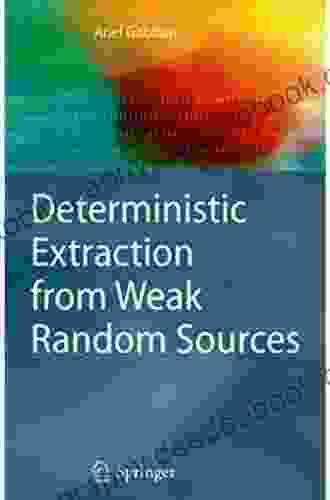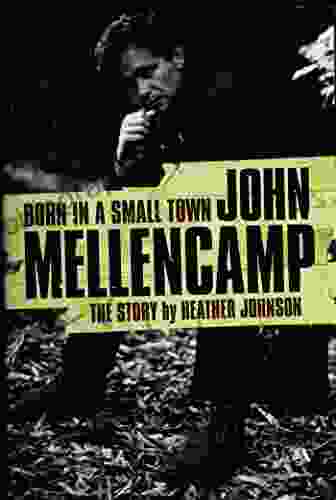Deterministic Extraction From Weak Random Sources: Monographs in Theoretical Computer Science

This book develops a framework for deterministically extracting nearly optimal randomness from arbitrary sources of weak randomness. This framework has found applications in cryptography, derandomization, data structures, and machine learning, and it has led to a number of important consequences, including new constructions of pseudorandom generators, derandomized algorithms, and randomness extractors.
Randomness is a fundamental resource in computer science. It is used in a wide variety of applications, including cryptography, derandomization, data structures, and machine learning. However, in many practical situations, it is difficult or impossible to obtain truly random bits. Instead, we must often rely on sources of weak randomness, such as the output of a physical random number generator or the results of a coin flip.
4.9 out of 5
| Language | : | English |
| File size | : | 9285 KB |
| Text-to-Speech | : | Enabled |
| Screen Reader | : | Supported |
| Enhanced typesetting | : | Enabled |
| Print length | : | 306 pages |
Deterministic extraction is a technique for extracting nearly optimal randomness from weak random sources. This means that we can take a source of weak randomness and convert it into a source of nearly random bits that can be used in any application that requires randomness.
The framework for deterministic extraction developed in this book is based on the notion of a condenser. A condenser is a function that takes a long string of weakly random bits and outputs a shorter string of nearly random bits. The quality of the output bits is measured by their min-entropy, which is a measure of their unpredictability.
The main result of this book is a construction of a condenser that can extract nearly optimal randomness from any source of weak randomness. This condenser is based on a new technique called the "amplification lemma." The amplification lemma shows how to take a weak source of randomness and amplify its min-entropy by a constant factor.
Applications
The framework for deterministic extraction developed in this book has found applications in a wide variety of areas, including:
- Cryptography: Deterministic extraction can be used to construct pseudorandom generators, which are efficient algorithms for generating nearly random bits from a small seed. Pseudorandom generators are used in a variety of cryptographic applications, such as encryption and authentication.
- Derandomization: Deterministic extraction can be used to derandomize randomized algorithms. A randomized algorithm is an algorithm that uses randomness to make its decisions. Derandomized algorithms are more efficient than randomized algorithms, and they can be used in applications where randomness is not available or desirable.
- Data structures: Deterministic extraction can be used to construct data structures that are more efficient than traditional data structures. For example, deterministic extraction can be used to construct a hash table that can be searched in constant time, even if the hash function is not perfect.
- Machine learning: Deterministic extraction can be used to improve the performance of machine learning algorithms. For example, deterministic extraction can be used to train a neural network that is more robust to noise.
Deterministic extraction is a powerful technique that can be used to extract nearly optimal randomness from arbitrary sources of weak randomness. This framework has found applications in a wide variety of areas, and it has led to a number of important consequences, including new constructions of pseudorandom generators, derandomized algorithms, and randomness extractors.
4.9 out of 5
| Language | : | English |
| File size | : | 9285 KB |
| Text-to-Speech | : | Enabled |
| Screen Reader | : | Supported |
| Enhanced typesetting | : | Enabled |
| Print length | : | 306 pages |
Do you want to contribute by writing guest posts on this blog?
Please contact us and send us a resume of previous articles that you have written.
 Book
Book Novel
Novel Page
Page Chapter
Chapter Text
Text Story
Story Genre
Genre Reader
Reader Sentence
Sentence Bookmark
Bookmark Shelf
Shelf Bibliography
Bibliography Foreword
Foreword Synopsis
Synopsis Footnote
Footnote Scroll
Scroll Codex
Codex Tome
Tome Bestseller
Bestseller Library card
Library card Autobiography
Autobiography Memoir
Memoir Thesaurus
Thesaurus Character
Character Card Catalog
Card Catalog Borrowing
Borrowing Stacks
Stacks Archives
Archives Study
Study Scholarly
Scholarly Lending
Lending Reading Room
Reading Room Rare Books
Rare Books Special Collections
Special Collections Interlibrary
Interlibrary Thesis
Thesis Dissertation
Dissertation Awards
Awards Book Club
Book Club Textbooks
Textbooks Earl A Grollman
Earl A Grollman Bradley Steyn
Bradley Steyn Jack Thorne
Jack Thorne Selena
Selena John Keane
John Keane Ellen Wiles
Ellen Wiles Patrick Mullins
Patrick Mullins Melanie Benjamin
Melanie Benjamin Tina Loo
Tina Loo The Gig Economist
The Gig Economist Shaa Fazal
Shaa Fazal Jenny Dean
Jenny Dean Cgp Books
Cgp Books Helen Ellis
Helen Ellis 2nd Ed Edition Kindle Edition
2nd Ed Edition Kindle Edition Scott G Nelson
Scott G Nelson Robert Brandon
Robert Brandon Jan Berenstain
Jan Berenstain Mona Field
Mona Field Sara Grace Skillman
Sara Grace Skillman
Light bulbAdvertise smarter! Our strategic ad space ensures maximum exposure. Reserve your spot today!

 Davion PowellMind Your Own Business: Basics of Entrepreneurship in Economic Systems and...
Davion PowellMind Your Own Business: Basics of Entrepreneurship in Economic Systems and...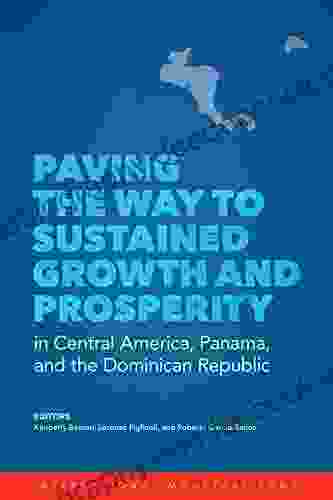
 Gabriel Garcia MarquezPaving the Way to Sustained Growth and Prosperity in Central America: Panama...
Gabriel Garcia MarquezPaving the Way to Sustained Growth and Prosperity in Central America: Panama... George OrwellFollow ·12k
George OrwellFollow ·12k Craig CarterFollow ·2k
Craig CarterFollow ·2k Percy Bysshe ShelleyFollow ·16k
Percy Bysshe ShelleyFollow ·16k Darren NelsonFollow ·9.4k
Darren NelsonFollow ·9.4k D'Angelo CarterFollow ·10.1k
D'Angelo CarterFollow ·10.1k Allen ParkerFollow ·16.1k
Allen ParkerFollow ·16.1k George MartinFollow ·18.1k
George MartinFollow ·18.1k Peter CarterFollow ·17.3k
Peter CarterFollow ·17.3k

 Fletcher Mitchell
Fletcher MitchellEducation And Peace Montessori 10: Where Learning...
A Symphony of Learning and Well-being Amidst...

 Glen Powell
Glen PowellUnveiling the Wonders of Language and Literacy...
Language and literacy...
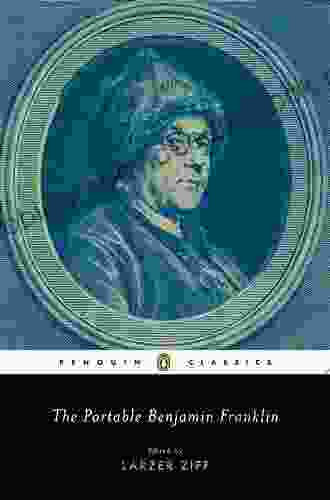
 Rod Ward
Rod WardThe Portable Benjamin Franklin: A Timeless Collection of...
In the vast tapestry of American history,...
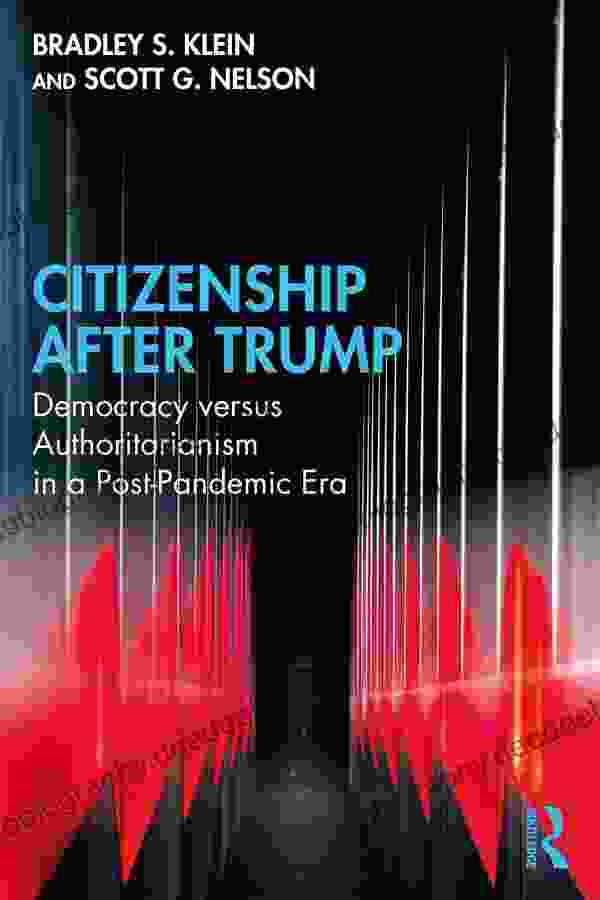
 Kelly Blair
Kelly BlairDemocracy Versus Authoritarianism in the Post-Pandemic...
The COVID-19...

 Colin Richardson
Colin RichardsonGet Inspired To Shoot Over 130 Poses
Are you looking for...

 Jared Nelson
Jared NelsonEmbark on a Shadowy Journey: The Forbidden Wilds and...
Prologue: A Realm Enshrouded in Darkness As...
4.9 out of 5
| Language | : | English |
| File size | : | 9285 KB |
| Text-to-Speech | : | Enabled |
| Screen Reader | : | Supported |
| Enhanced typesetting | : | Enabled |
| Print length | : | 306 pages |


